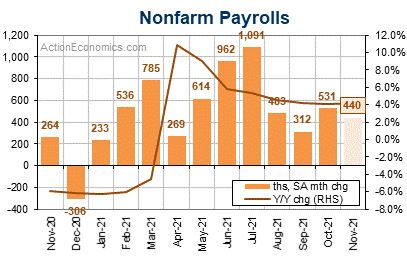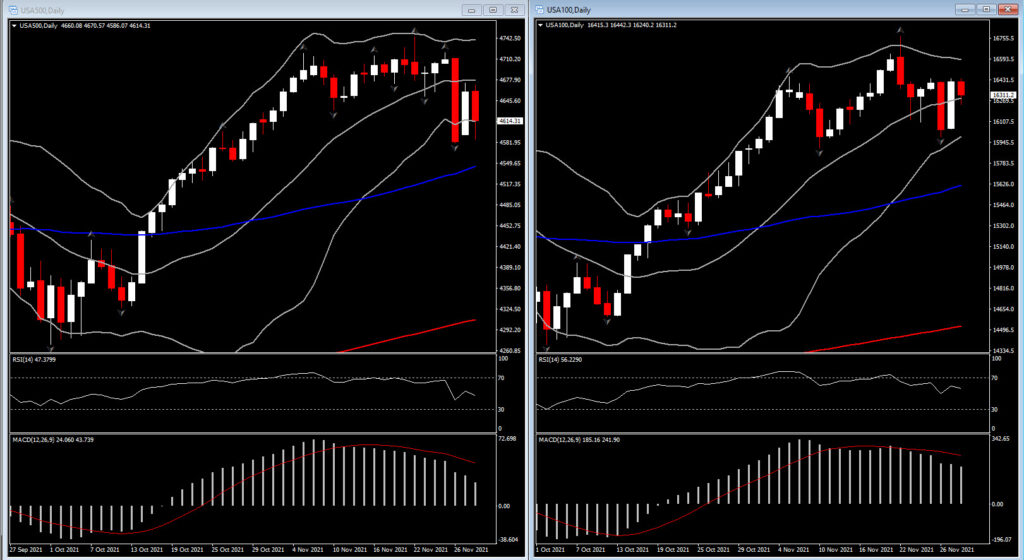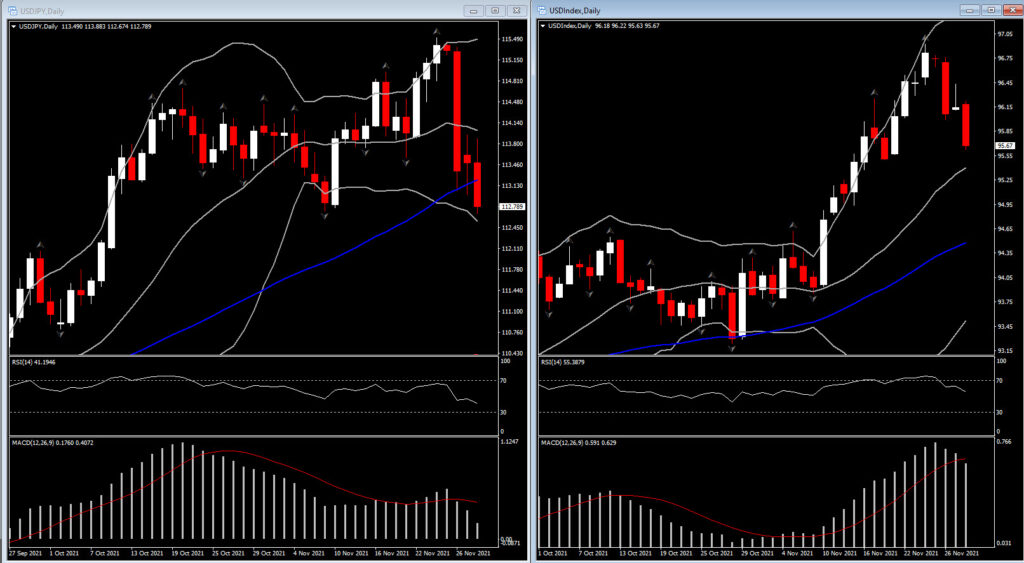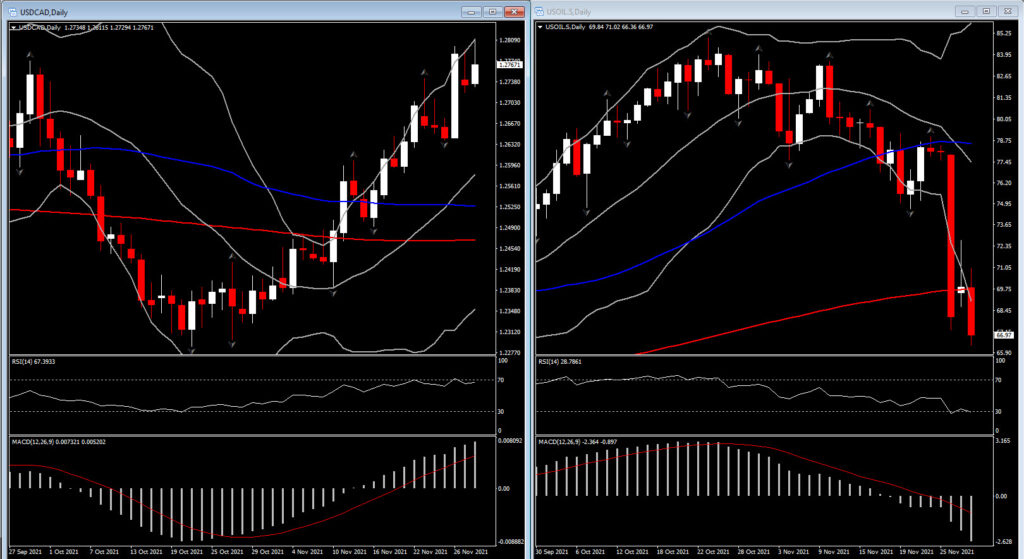The markets changed on a dime last week as worries of the bearish impacts over the new Omicron covid variant weighed heavily on equities, while concurrently supporting a swift flight into haven assets. Inflation trades were hit hard and oil prices plunged alongside hefty declines in travel shares and financials. The USA30’s -2.5% plunge on the day was the largest since October 2020. For the week, Wall Street was off -2.3% to -3.1%. But losses in Europe were much deeper with the UK100 crashing -6.1%, while the GER30 tumbled -5.6%.
Meanwhile, fears over near term hawkish central bank outcomes from the BoE and FOMC were sharply deflated, and that helped knock yields lower too. Treasury yields richened double digits, taking the 2-year down to 0.498% at the close, with the 10-year at 1.473%. The Gilt slid 14.5 bps to 0.819%, while the Bund was down 8.7 bps to -0.341%. The focus on Omicron will distract the markets from key data ahead. There is also a host of Fedspeakers.
The calendar has a few important data releases this week but they will lose some of their potency as worries over the Omicron virus will keep the tone jittery and outlooks more uncertain. This week’s focus was going to be the nonfarm payroll report on Friday as the FOMC has yet to fulfill the second part of its mandate, full employment, though it is getting closer, but now, Omicron will take the top spot on the wall of worry as the spread is monitored, along with the various mitigation measures. Already the US and other countries are banning travel from Southern Africa. Meanwhile, there is another heavy Fedspeak docket and it will be helpful to hear their views on current conditions, though we don’t expect any of them to pre-judge their decisions for the December 14-15 policy meeting considering how quickly things change. 
Until Omicron reared its ugly head, inflation was going to remain in focus this week, although attention would quickly turn to Friday’s November jobs data with another strong report the potential catalyst for the FOMC to announce it would speed up its QE tapering in December. Numbers in line with projections could be close to getting the Fed to pick up the pace as Chair Powell has said it’s the accumulation of evidence, not necessarily the report. A 440k increase is expected in November payrolls after the 531k rise in October. The jobless rate should hold steady at 4.6% for a second month, down from 4.8% in September. Hours-worked are assumed to rise 0.3%, while the workweek holds at 34.7 from October. Average hourly earnings are assumed to rise 0.4% with the y/y wage gain climbing to 5.0% from 4.9%.
Meanwhile, so far today the US Dollar has come under fresh pressure as virus jitters fueled another wave of risk aversion. The USDIndex is at 95.74, below the 6-session low of 95.75 it clocked on Friday. The index had bounced to 96.44 highs in NY on Monday, as traders largely determined that the Omicron scare on Friday was overdone, but warnings from Moderna that the variant will leave current vaccines much less effective, saw traders ditching stocks and moving back into bonds. The US 10-year rate plunged -7.3 bp to 1.426% and oil prices slipped to USD 68.32.
EURUSD lifted to 1.1360 amid a broad move higher in the single currency. Bunds are underperforming versus Treasuries, ahead of what is likely to be a very hot Eurozone inflation number and as German labour market data continues to look better than anticipated. ECB Vice President Guindos repeated this morning that inflation is likely to stay higher for longer, although officials have been trying to play down the importance of the inflation spike, which saw German HICP hitting 6.0% y/y yesterday. The impact of the Omicrom virus variant remains unknown, and until scientists get a better handle on the transmissibility and virulence of the new strain, markets are likely to remain jittery. Yields remain below recent highs, but even if it may take two weeks for full details on the new Covid-variant to be confirmed, it seems unlikely that Fed QE tapering and the timeline for rate hikes will be impacted to the extent Friday’s moves suggested. Still, until details on the variant are fully known, USD may remain fickle.
USDCAD lifted to 1.2797 as a fresh wave of risk aversion has hit confidence in the global recovery and oil prices. Fresh warnings that existing vaccines won’t be as effective against the Omicron variant have weighed on confidence and the USOIL has dropped to just $67.98 during the European AM session, which has put pressure on the CAD. Indeed, oil prices will continue to drive CAD direction, though traders will also keep a close eye on Canada GDP data today.
Russia’s Deputy Prime Minister Novak said a meeting of the OPEC+ joint ministerial monitoring committee “was postponed to get more information about the current events, including the new virus strain”. After speculation of a reaction to the release of strategic oil reserves, the comments added to talk that OPEC+ may postponed the planned increase in output as Novak confirmed that the alliance will discuss “the need for measures.
Nevertheless, there is a host of Fedspeakers this week, including Chair Powell, VC Clarida, and Williams. It may be too early in the Omicron phase for them to shed much light on their thinking, but comments from Bostic on Friday suggested he is not worried, yet. Chair Powell and Treasury Secretary Yellen will testify on the CARES Act before the Senate Banking Committee today, and then again before the House Financial Services Committee (Wednesday). Williams (Tuesday) will speak at a food insecurity event. VC Clarida (Tuesday), who will be out of this job soon, discusses Fed independence. Bostic (Thursday) will speak on the high cost of housing and will also take part in a Reuters event. Daly and Barkin (Thursday) will be at the Peterson Institute. And Bullard (Friday) will speak at the Missouri Bankers’ Association. The Beige Book (Wednesday) will likely reflect ongoing inflation concerns as well as some further downshifting in economic activity, as was the case in the October release.
Click here to access our Economic Calendar
Andria Pichidi
Market Analyst
Disclaimer: This material is provided as a general marketing communication for information purposes only and does not constitute an independent investment research. Nothing in this communication contains, or should be considered as containing, an investment advice or an investment recommendation or a solicitation for the purpose of buying or selling of any financial instrument. All information provided is gathered from reputable sources and any information containing an indication of past performance is not a guarantee or reliable indicator of future performance. Users acknowledge that any investment in Leveraged Products is characterized by a certain degree of uncertainty and that any investment of this nature involves a high level of risk for which the users are solely responsible and liable. We assume no liability for any loss arising from any investment made based on the information provided in this communication. This communication must not be reproduced or further distributed without our prior written permission.






















